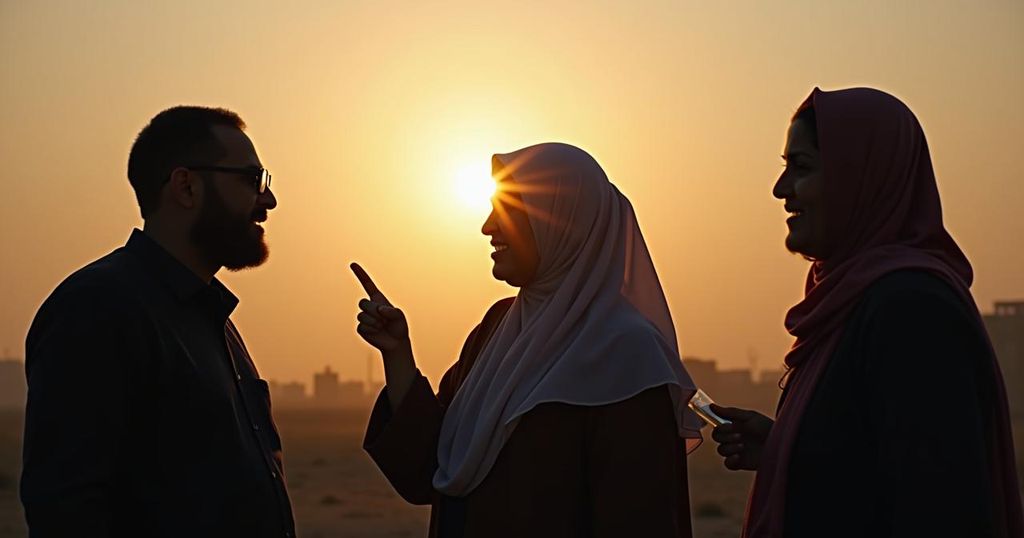Georgia’s Muslim Voters Reject Major Candidates Over Israel Support

Muslim voters in Georgia are rejecting support for Vice President Kamala Harris and former President Donald Trump due to their backing of Israel amid the Gaza conflict. With a campaign urging third-party votes, the Muslim electorate is positioning itself as a critical factor in the upcoming election, expressing dissatisfaction with both candidates’ policies.
A notable segment of Muslim voters in Georgia has expressed their intention not to support either Vice President Kamala Harris or former President Donald Trump in the upcoming election, primarily due to both candidates’ staunch backing of Israel amid the escalating situation in Gaza. Vice President Harris has affirmed Israel’s right to self-defense and indicated she would continue military support, while also advocating for a ceasefire in Gaza. In contrast, Mr. Trump has identified himself as Israel’s “protector” and reasserted his support for the nation. The implications of these positions are significant in Georgia, a state crucial to the electoral outcome, particularly following Trump’s narrow defeat in 2020. The Muslim electorate in Georgia holds essential sway over the state’s 16 electoral votes, with a recent poll indicating a nearly equal division of support for Harris and Trump among Muslim voters nationwide. Kristen Truitt, a Muslim voter from Atlanta, articulated his discontent with the Democratic Party’s stance on Israel, stating, “Just to give unlimited funds and access to Israel, I think that is totally ridiculous.” This discontent is echoed amidst the ongoing conflict that has intensified since October 7, 2023, resulting in thousands of casualties on both sides. In response to the perceived neglect of their interests by the two major parties, a campaign named “Abandon Harris” is urging Muslim voters to consider third-party candidates, positing that the community should not settle for the “lesser of two evils.” Kareem Rosshandler, the co-chair of the campaign, asserted that Muslim votes should not be taken for granted, mentioning that they have garnered over 10,000 commitments from voters to support alternative candidates critical of the conflict. Political analysts suggest that Harris may suffer more significantly from the defection of Muslim voters than Trump, who has traditionally struggled to attract this demographic. Alicia Hughes, an expert in voting behavior, noted that should either candidate voice stronger opposition to Israel, it might not result in increased support from the broader electorate, as they could risk alienating other voter segments. In summary, the dynamics of support among Muslim voters in Georgia reflect a growing dissatisfaction with the prevailing policies regarding Israel, prompting calls for a reevaluation of party allegiance and a push towards third-party alternatives.
The relationship between U.S. presidential candidates and the Muslim voter base has historically been complex, particularly in light of geopolitical tensions in the Middle East. As the conflict in Gaza escalates, Muslim voters express significant discontent with candidates who explicitly support military action in favor of Israel. The electorate’s sentiment is crucial as battleground states like Georgia may determine the election outcome, particularly given their changing demographics and the increasing importance of minority communities. The Arab American Institute’s polling data indicates a nuanced position among Muslim voters, who feel their concerns regarding U.S. foreign policy are inadequately addressed by mainstream candidates.
The growing opposition from Muslim voters in Georgia signifies a critical moment in the electoral landscape, especially as both Vice President Harris and former President Trump navigate their support of Israel. The call for third-party votes reflects a broader disillusionment with the major parties’ approaches to foreign policy, particularly regarding the Israeli-Palestinian conflict. This movement emphasizes the importance of addressing the concerns of diverse voter constituencies to foster a more inclusive political discourse ahead of the elections.
Original Source: www.foxnews.com








